
Continuing my series of strategy posts about Brave New World's modified civilizations, I'm going to take a look at strategies for Bismarck's well-rounded Germany. Since Brave New World's fall patch, Germany's unique Landsknecht has been replaced with a Hanse (bank replacement) that makes Germany into a more well-rounded civ rather than being exclusively military-focused.
The region of Germany has been the site of some of the most violent and destructive wars in the history of the world. It was given its name by Julius Caesar, who called the region east of the Rhine "Germania" to differentiate it from Gaul, which he had already subjugated. The region was populated by tribes of Germanic people who were often labeled as barbarians by the Romans who were never able to fully annex the territory. Most of German lands were controlled by the Franks such as Charlemagne following the fall of the Roman Empire, and they would not be united into their own sovereign nation until Otto I would become the first emperor of the Holy Roman Empire in 962 C.E.. When Martin Luther founded the schism religion of Protestantism, the Holy Roman Empire descended into the Thirty Years War, in which the northern Protestants fought for their autonomy against the southern Catholics. Following the war, the lands of Germany were broken up into multiple nation states such as Prussia and Saxony.
In the aftermath of the Napoleonic Wars, a series of social and industrial revolutions drove Prussia into becoming a leading educational and cultural states in Europe, and its Chancellor Otto von Bismarck effectively established the modern Germany in 1871. The German economy grew over the next few decades, but it was defeated in World War I, forced to pay reparations, its leadership was replaced with an unstable republic, and its economy completely crashed. All this lead to a takeover by the National Socialists (Nazis) who rapidly rebuilt Germany's economy and industry and turned it into a war machine that struck with greater speed and efficiency than the world had ever seen. Despite all the bitter bloodshed, a democratic Germany has emerged from the chaos as one of the strongest economies in Europe and is a worldwide leader in technological, scientific, and cultural development (and humor).
Otto Eduard Leopold, Prince of Bismarck, Duke of Lauenburg is known more simply as Otto von Bismarck. He is responsible for uniting the fractured states of Germany into a modern, unified German nation through the use of an efficient military and shrewd diplomacy. He was known to have a violent temper, but was a brilliant statesman and diplomat nonetheless. He became famous for using balance of power strategies to maintain peace in Europe while also furthering his goals as the political leader of Germany. Though he was staunch conservative autocrat, he did pass a series of social reforms that improved the quality of life for Germans. This, combined with his strong leadership, made him beloved by the German people. He was eventually unseated by Kaiser Wilhelm II, whose aggressive expansionist policies are often credited with leading to World War I.
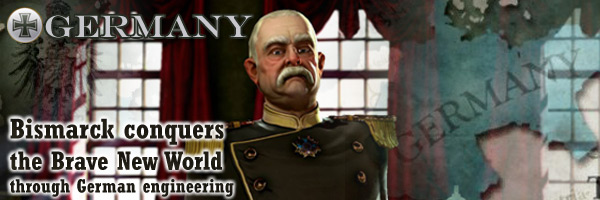
German uniques in Civilization V: Brave New World (post-Fall patch)

Germany's Medieval Landsknecht unique unit has been replaced by a Renaissance Bank that buffs production in a city based on trade routes with City-States. This change makes Germany a more well-rounded civilization, since they now have economic, diplomatic, and production flavors in addition to their strong military. The likelihood of converting barbarians was also upped from 50% to 67% in the patch revision.
Furor Teutonicus ("Ferocity of the Germans")
"Upon defeating a Barbarian unit inside an encampment, there is a 67% chance you earn 25 Gold and they join your side. Pay 25% less for land unit maintenance."

Germany's unique trait allows it to accumulate a massive early-game land army without having to spend a single turn of production in cities on unit-building. This frees up those cities to focus on buildings, workers, settlers, trade units, and wonders, which can grant Germany early leads in various economic demographics. The maintenance discount and bonus gold also ensures that all those free units are less likely to break the bank. Unfortunately, Germany's trait is dependent on luck, and can't be relied on completely. In some games, you may get more free units than you will know what to do with. In other games, you may get none!
Editorial Note: I think Germany's trait should have been modified to:
"After killing a barbarian unit inside an encampment and dispersing the encampment, either the Barbarians will join your side, or you receive 25 Gold."
This would have ensured that Germany always receives a benefit from clearing encampments, even though the specific reward would be up to the RNG. But alas, that isn't how it works...
The description for Furor Teutonicus is a bit misleading, since Germany can acquire free barbarian units from unoccupied camps. According to the game source code, the unit type that Germany receives is initially empty, and is set (or reset) each time that Germany kills a barbarian in an encampment. After that, clearing an encampment triggers the chance of receiving a copy of whatever unit is set. If you kill a barbarian in an encampment at the same time that you disperse the encampment, then the saved unit is reset to the newly-killed unit and then the free unit is awarded. If you use a ranged unit to kill a barbarian inside of an encampment, then the saved unit type is also reset with the new barbarian unit, even if you don't capture the [now empty] encampment.
If you want a specific unit type (i.e. a Handaxe), then you can find an encampment with that unit inside and kill it (capturing the encampment is optional). After that, do not kill any barbarian units inside of any camps (unless they are also the unit you are trying to farm - i.e. a Handaxe). If you find another camp with a different unit (i.e. a Brute), you can lure that unit out with an un-escorted settler or worker, then capture the empty encampment to get the unit you wanted (i.e. a Handaxe).
But if the German player doesn't kill any barbarian unit inside of a camp at all, then they won't receive any extra reward for capturing the encampment. For example, if Germany has not killed a single barbarian within any encampment, and if another player's archer kills a barbarian in an encampment with a ranged attack, and then Germany disperses the empty encampment on its own turn, then Germany receives no reward. If, however, Germany had previously killed a barbarian unit inside of another encampment, then Germany will have a chance of receiving the free unit from dispersing the new, empty, encampment.
Upon dispersing an encampment, Germany can receive a copy of the last unit that it killed within an encampment.
It is important to note that the 25% Furor Teutonicus maintenance discount applies to all Military land units. So all your ranged, mounted, and siege units will also be discounted. This makes the German discount more beneficial than the Zulu's Iklwa unit discount, since Germany can maintain a much more diverse set of units, and the discount still applies to your Gunpowder and Mobile units in the later half of the game.
Despite the maintenance discount, Germany can still suffer from excessive maintenance costs. Keep an eye on your gold per turn as you assimilate barbarian units to your side. It is also not uncommon for Germany to run up against the unit cap. If either of these happens, don't be afraid to disband a few units. Fortunately, the unit cap is not a hard cap, so you can continue to build units (including Settlers) after you hit the cap.
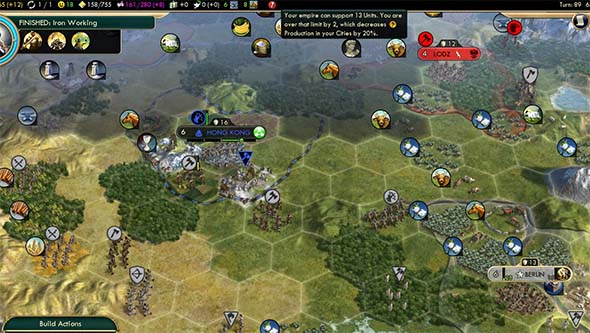
Each unit that you own beyond the cap allowance decreases production in cities by 10%!
It can be a debilitating penalty if you grow your army too fast without settling new cities.
Hanse
Game Info: "Unique German Bank replacement. +5% Production for each Trade Route your civilization has with a City-State. Trade routes other players make to a city with a Hanse will generate an extra 1 Gold for the city owner and the trade route owner gains an additional 1 Gold for the trade route."

Civilopedia Strategy: "In addition to the regular abilities of the Bank (additional Gold output, and additional Gold from Trade Routes), the Hanse provides Production for each Trade Route within your civilization that connects to a City-State. The Trade Routes can come from any combination of cities, even cities without the Hanse (Example: If you have trade routes from Berlin to Geneva, Munich to Geneva, Munich to Berlin, and Berlin to Brussels, then all cities with the Hanse would get +15% Production). Only Germany may build it."
Replaces: Bank.
Requirements: Banking technology
Cost: 200 Production (same as Bank).
Effects: +2 Gold, +25% Gold (same as Bank),
+5% Production for each trade route that Germany sends to a City-State..
Specialists: provides 1 merchant specialist slot.
In addition to the regular benefits of a bank, the German Hanse also grants a 5% production boost to its city for each trade route that Germany is sending to any City-State. The trade route does not need to originate from the same city in which the Hanse is built, and the trade routes do not have to be to unique City-States (in contrast to Morocco's ability). All trade routes with City-States count for the Hanse bonus in all cities with a Hanse.
So if you have to, you can have every one of your cities send a trade route to the same City-State, and every city with a Hanse will benefit from all of those trade routes. This is useful if there's only a couple City-States that generate worthwhile trade revenue (these may often be Mercantile City-States since they have unique luxuries), or if you are enemies with most of the City-States in the game.
At the opposite extreme, you can send all of your trade routes out of a single city but into different city states, and the effect will be the same: all cities with Hanses will benefit from all of those trade routes.
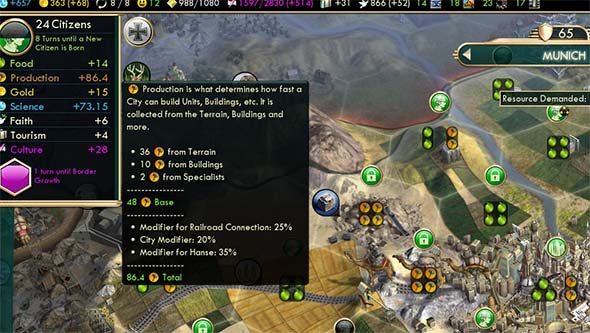
Hanses combined with the railroad connection bonus will make your late-game cities into production powerhouses!
If all your cities have a Hanse, and you have six (6) trade routes going to City-States, then Germany will be beating Rome's "Glory of Rome" production bonus and getting the bonus in the Capital too. Unfortunately, you have to wait until the Renaissance in order to get this building, so you'll only have these production benefits for the second half of the game. By the end of the game, you can have a maximum of 10 trade routes (8 from techs, and 1 each from Colossus and Petra). If all 10 of these trade routes are sent to City-States (even if it's the same City-State), and all of Germany's cities have Hanses, then all Germany cities will generate +50% production!
Panzer

Game Info: "Fast and powerful late game Unit.
Only the Germans may build it. This Unit has 1 additional movement compared to the Tank, which it replaces."
Civilopedia Strategy: "The Panzer is the German unique unit, replacing the tank. It is both stronger and faster than the tank. It also can move after combat, allowing it to blow huge holes in enemy lines and then barrel through before the enemy can repair the gap."
Replaces: Tank.
Requirements: Combined Arms technology, 1 Oil resource, and 1 gold per turn maintenance (same as Tank).
Cost: 375 Production / 750 Faith / 1090 Gold (same as Tank) [Standard speed].
Attack Type: Melee, Combat Class: Armor, Combat Strength 80 (+10 from Tank).
Movement Speed: 6 (+1 from Tank).
Bonuses: Can move after attacking (same as Tank).
Penalties: No defensive terrain bonus (same as Tank).
The Panzer is a very fast and strong late game unit. They have a significant strength advantage against Infantry and other Tanks and are effective in most one-on-one encounters (except against Anti-Tank and Helicopters).
Panzers are especially effective in groups. Their increased speed means they can maneuver around enemy zone of control and attack weaker units behind the lines. This speed advantage can be used to out-flank and crush enemy Artillery before they can be used against your own front line or cities. Panzers are also great for accumulating flanking bonuses, as you can move multiple tanks in to surround an enemy, then crush him. And since all tanks can move after attacking (Panzers are no exception), the extra movement means that you can likely move them adjacent to another enemy unit for another flanking bonus, or pull them back out of range of the enemy's counter attack.
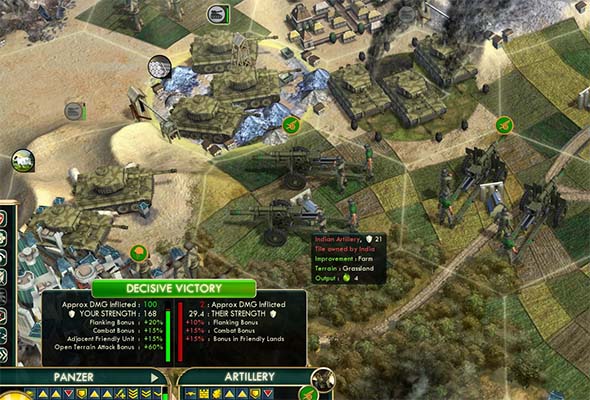
The speed of Panzers allows it to outflank enemy formations and attack support units like Artillery and Machine Guns.
The Panzer has the same base movement speed as the Helicopter Gunship, so if you see Helicopters approaching your Panzers, you can still retreat them back to your own territory and cities and use your Fighters and Jet Fighters to handle the Helicopters. The Panzer's speed also makes it a great defensive unit, as it can mobilize at a moment's notice to deal with invading enemy units. Promoted with Mobility and Lightning Warfare (Autocracy tenet), a Panzer can attain 8 total movement, making it the fastest land unit in the game.
It is important to use your Panzers while you can. Since the strength and movement bonuses are intrinsic to the unit (as opposed to promotions), they do not carry over when the unit is upgraded to a Modern Armor.
General strategy for Germany
Germany can potentially amass a huge early game land army and should not neglect this opportunity. Because Germany can rapidly reach the unit cap early in the game, you will likely need to settle a couple new cities quickly in order to keep converting units from barbarians and grow your army. Since you likely won't have to dedicate much time in your cities producing early units, you can start training Settlers earlier and more often.
If your opening Scout gets upgraded to an Archer via a ruin, then you can use him and your starting Warrior to start barbarian-hunting right away. If you're lucky, you'll get enough extra units that you won't need to build any units at all in your capital. Instead, you can build a Library, Shrine, Granary, and maybe even start on a wonder!
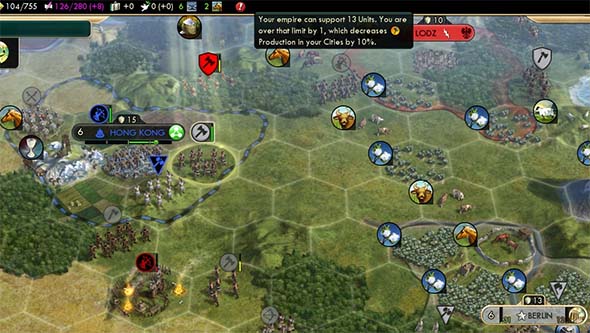
Getting free barbarian units frees Germany to start training Settlers earlier and more often.
They'll need the settlers to avoid hitting the unit cap.
Personally, I recommend Liberty for Germany's opening policy tree, especially on larger maps and Pangaea type maps in which there will be more open space for barbarians to spawn. It will allow you to quickly expand to raise your unit cap and keep growing your army, as well as grant a free worker so that you may not have to build any units in the beginning of the game.
However, Tradition is just as viable, especially if you plan on conquering cities rather than founding them. It's also a better option on smaller maps with less land mass for barbs to spawn. Having fewer cities (with a Tradition start) will leave more of the map in the fog of war and allow additional barbarian camps to spawn near you, and it will give you access to the powerful gold and happiness buffs that Monarchy grants in the capital.
After a Liberty or Tradition policy or two, and once you've gotten most of your initial exploration out of the way, you might also want to open Honor. This will reveal the location of barbarian encampments in revealed terrain so that you can quickly mobilize your growing army to destroy them, and it will also give you a significant combat bonus that will make it quicker and easier to kill the barbs and clear the encampments. Having Honor adopted means that you'll also earn lump sums of culture whenever you kill a barbarian unit.
Split up your standing forces into groups of two or three units and send them out in multiple directions in order to clear as many encampments and kill as many barbarians as possible. This is also a great way to farm City-State friendships/alliances early in the game. If you find an encampment near a City-State, you may want to fortify near it for a few turns and wait to see if the City-State asks you to kill the encampment as a quest. Leaving a path open for the barbarians to approach the city state and attack makes it more likely that the city state will ask for the encampment to be cleared. And don't forget to send your units back to your territory in order to upgrade them as Composite Bows and Swords become available, and also to make sure they have the embarkation promotion after you research Optics.

Since I strongly recommend adopting Liberty, you'll also want Citizenship (free worker and faster improvement rate). I also strongly recommend building the Pyramids for two free workers and an additional boost to improvement speed. The A.I.s rarely build the Pyramids, and it costs barely more than the two workers it gives anyway, so it's well worth the effort to build it.
Since you won't need many extra workers now, feel free to return any workers that you liberate from barbarians back to the City-States for the extra influence. Whether or not you return captured workers to other civilizations is up to you and will depend on whether you want their friendship or not.

Having a large army early in the game will likely spare you from having to deal with unit rushes from aggressive civs like Assyria, Aztecs, Greece, and Zulu, which will allow you to start on your own conquests or focus on domestic and economic development. If you decide not to use your large army for open warfare, then you can split it up and start demanding tribute from City-States. Otherwise, you may want to work on the Statue of Zeus. You'll likely get mostly melee units from barbarians, so the statue of Zeus's combat bonus against cities will make help offset the lack of ranged support if you plan on going for a domination victory.
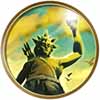
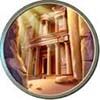
Germany doesn't have a coastal or desert bias, but if you can get a coastal or desert city early, then go for Petra and / or Colossus! Or just capture these wonders later... The additional trade routes will further buff the production bonus of Hanse in your cities by 10% (for a potential grand total of +50% production with all 8 trade routes unlocked from technologies).
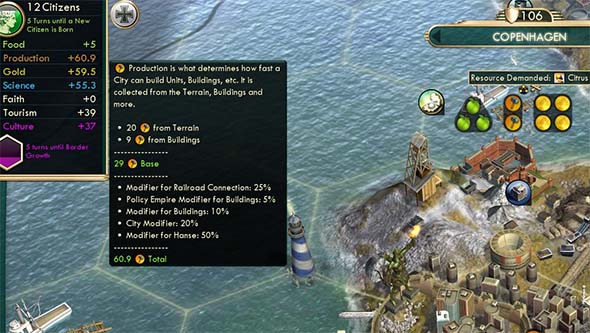
With Colossus and Petra, and all 8 trade routes unlocked from technologies,
your Hanses can grant up to 50% production bonus in all cities!
As far as national wonders go: despite being a very military-oriented civ, Germany does not need to put high priority on the Heroic Epic. A large percentage of your army will likely come from converted barbarians rather than being built in cities. You'll still want the Heroic Epic eventually (when it comes time to start pumping out Knights, Cavalry, and Panzers), but it can probably wait until well into the Renaissance. This will, of course, depend on how many units you receive from barbarians, and whether you intend to pursue a domination victory.
Our faith will keep us safe
I generally didn't invest much into faith in most of my Germany games. There just aren't any beliefs that really stood out to me as uniquely strong for Germany.
If you adopt a pantheon or a religion, then the beliefs that you chose are almost entirely up to you. In games in which I had early faith generation, I usually went for beliefs that boosted production and / or happiness if there weren't any obvious resource buffs available. God of Craftsman and Goddess of Love were common pantheons in my Germany games. Defensive beliefs such as Faith Healers and Goddess of Protection can also be good at repelling invasions in case someone decides that you're territory is vulnerable while the bulk of your army is out hunting barbarians.
If you get a full-blown religion, then Ceremonial Burial can be a good founder belief, since it will help support the happiness needs of an expansive empire. Interfaith Dialogue can also help to offset the science penalties associated with more cities and the fact that your trade routes to city states won't be generating science. It also takes advantage of Germany's nature as a religious underdog, since you won't likely be able to maintain a religious majority in most foreign cities if you're competing with any civ that has a buff towards religions or faith.
I was also fond of the Religious Community follower belief (+1% production per follower in the city, up to 15%) if no religious buildings were available. With this belief and your Hanse, your cities can be generating up to 65% production bonus at the end of the game!
Efficient use of trade routes
Once you research Banking and start building Hanse, you should reconsider any trade routes that you are using to ship production between your cities. By redirecting those trade routes towards City-States, you can get gold, possible influence with the City-State, and will buff the production of every city that has a Hanse (rather than just the city receiving the trade route). Unless your city is generating over 200 production (unlikely), then the production boost will be a fraction of what you received from the internal route. But the fact that every city benefits may make up for this decline in the one city's productivity (especially if you have multiple routes going to city states), and you'll make extra gold on top of that.
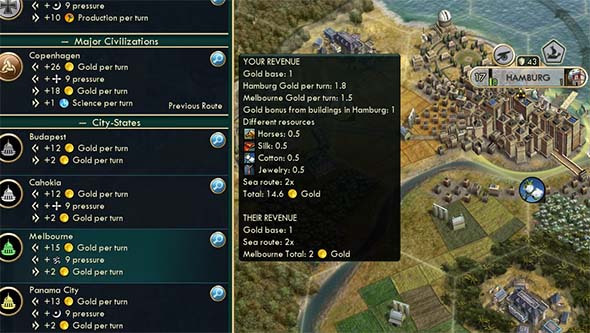
In the renaissance, start redirecting trade towards city states - especially formerly internal, land-based routes.
This is especially true of land-based routes, which don't generate as much food and production as sea-based routes anyway. So it might still be worth using Cargo Ships to send production to your Capital (or primary wonder-producing city). Since Hanses give the same production boost regardless of whether the route to a City-State is by land or sea, you can allocate your land routes to go to City-States, and use sea routes to continue to ship large amounts of production to your most industrious city(ies) and to other civs, since they are more efficient.
The Patronage policy tree may be a wise investment for Germany in the mid-game. Building and maintaining relations with the City-States that you trade with is vital to ensuring that a sudden declaration of war from their ally doesn't kill your valuable trade routes. Scholasticism can help make up for the science that you are losing out on by trading with City-States rather than civilizations. The Merchant Confederacy policy at the bottom of the right hand branch will add +2 gold to all your City-State trade routes. Both of these are valuable if you plan to maximize your Hanse bonus.

If you adopt Patronage and maintain alliances with City-States, then you'll have a little bit of sway in the World Congress. Having the extra delegates from the Forbidden Palace will give you even more influence in the World Congress, which can be especially useful if you get a lot of warmonger hate and have trouble getting other civs to agree with your proposals.
Commerce can also be a good tree to open if you can afford the extra social policies. The opener will help offset the money lost from not trading with other civs, and Wagon Trains will further boost your caravan income. If you're on a heavily sea-based map, then consider Exploration instead. The Treasure Fleets policy is the seafaring equivalent to Wagon Trains, but it is deeper in the tree, so you'll have to invest more into it.

If you can afford to send most (or all) of your trade routes to City-States, then your Hanses will generate 40% (or 50% with Colossus and Petra) more production in cities, which will give you a great advantage towards competing in World Congress projects, building a larger army or late-game wonders such as the Pentagon. You'll probably want to beeline to Combined Arms anyway to unlock your Panzer, so building the Pentagon early will discount your upgrade from Cavalry to Panzer, as well as modernizing your other units.
Ideologies and end-game
Germany has strong synergies with all three ideology trees, so the one that you chose will be dependent on your particular playstyle and objective. Any of the three can be used for a Culture Victory since they all have tenets that buff tourism.
Autocracy: The Third Reich conquers the world
Germany's military-oriented trait and late-game unique unit makes it a good candidate for a Domination Victory and the Autocracy ideology. Most of the good tenets for Germany are in the second tier, so you'll have to pump a lot of culture into your ideology in order to gain access to them before your Panzers become obsolete. Your level 1 tenets are situational.
Your first level 2 tenet should probably be Nationalism, as its will further reduce your unit maintenance costs. This discount will apply to all units, including air, naval, and civilian units, and it will also grant a 33% to the reduced maintenance (from Furor Teutonicus) of your land units.
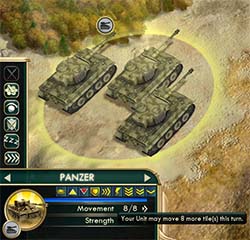
Lightning Warfare and the Mobility promotion combine to give Panzers 8 movement!
Adopting the level 2 Lightning Warfare tenet will grant additional movement and attack bonuses to your tanks. This will give Panzers 7 total movement (without upgrades), which allows them to outrun helicopters on flat terrain! With the Mobility promotion, your Panzers can have 8 movement and ignore zone of control!
The only other land unit that can move this fast is a Shoshone Comanche Rider that is upgraded to a Tank and has Mobility and Lightning Warfare. If you happen to spot a Militaristic City-State gifting out Comanche Riders in the Industrial era, try to become its ally. A Panzer upgraded from a Comanche Rider can have up to 9 total movement with the Rider's unique promotion, mobility, and lightning warfare.
The Panzer does still require Oil, so adopting Third Alternative will double your strategic resources and allow you to support a large army of Panzers without having to sacrifice air or naval power.
If another civilization adopts Order and completes the Kremlin early, you should consider taking it from them and annexing the city to turn it into a Panzer-farm.
Lastly, during any periods in between wars, you can use Gunboat Diplomacy to gain free influence from city states using your massive army! This can potentially enable a Diplomatic victory, but at the very least, it will give you some sway in the United Nations.
Freedom: Tear down this wall!
If you're planning on playing peacefully, then Germany's trade routes with City-States can pay off by adopting Freedom.
The level 3 tenet Treaty Organization will give you influence with any City-State that you trade with (+4 per turn). Since you'll want to trade with as many City-States as possible in order to maximize your Hanses, this tenet can make maintaining alliances with those City-States almost trivial (unless Greece has a stranglehold on them). This will give you more votes in the World Congress and United Nations and can easily contribute to a possible Diplomatic Victory.
Capitalism (level 2) is also an obvious choice for Germany since you'll want to have Hanses in every city. This tenet will grant additional happiness to those Hanses, as well as Mints and Stock Exchanges.
Order: Socialism allows redistribution of Panzers
If you're playing peacefully, but are worried about other warmongers, then Order is probably a more appropriate choice assuming you expanded to control a lot of cities.

Panzers are powerful unique units, and you'll want to build quite a few of them. The Kremlin wonder is unlocked by adopting Order, and it will speed up your production of Panzers (in the city that built it only)! If you get strong pressure from Autocratic civs, then you can possibly switch ideologies to Autocracy to adopt the Lightning Warfare tenet!
The speed and strength of Panzers makes them great defensive units. With a modest railroad network (and airports if you have a multi-continental empire), Panzers can instantly mobilize to virtually anywhere within (or near) your territory in order to meet invading forces. As long as those invading forces aren't Helicopter Gunships, you should have little trouble repelling them with an army of Panzers. A good supply of AA Guns will also help protect your Panzers from Helicopters and prevent enemy planes from annihilating your Panzers from above.
The level 1 tenet Patriotic War will grant a combat bonus inside friendly territory, so your large defensive army will be even more of a deterrent to invasion.
The level 2 tenet Five Year Plan will add extra production to cities, mines, and quarries, which will be boosted by the production bonus of the Hanse. Germany also seems to start near Stone very frequently, so that's an extra perk of this tenet. Another good level 2 tenet is Worker's Faculties (+25% science in cities with a Factory). Since Germany should be focusing on production, you will likely have lots of Factories, so this will help to keep your science strong and offset the per-city penalty to research and will help contribute towards a Scientific Victory.
Pacifying the furious Teutones: countering Bismarck's Germany
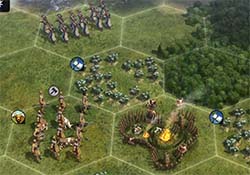
Finish off barb encampments before Germany
to stunt their military growth.
But don't leave empty camps unattended
while German units are around!
Germany can sometimes be very aggressive early in the game, and they also tend to be more successful than some other early-game warmongers like the Aztecs because Germany will have the raw numbers to back up their aggressive demeanor. The only real way to stop Germany from converting barbarians is to kill the barbarians yourself first. If Germany is one of your immediate neighbors, then consider adopting Honor and dedicating a group of three units or so to hunt barbarians that spawn near Germany. In addition to stunting Germany's military growth, you may also earn some gold, culture, and maybe even some City-State influence for your trouble.
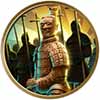
Bismarck's A.I. is also quite fond of building the Terracotta Army, which can make their army even bigger. The Brute and Hand Axe are both unique barbarian unit types that will be duplicated if Germany builds this wonder. Building this wonder for yourself can give you more early-game units to help you defend yourself from Germany or deter invasion, and it keeps it out of Bismarck's warmongering hands.
If Germany's military becomes too big, then you can potentially exploit some of the disadvantages that they receive: production penalties, resource penalties, crippling maintenance costs, etc. If you're worried about their military growth, then avoid trading with them so as not to give them money to pay for their unit maintenance and upgrades. A sneaky trick would be to trade iron to them so that they upgrade all their Warriors and Brutes to Swordsmen, then if you end the deal, they will have likely suffer significant resource penalties that could mean the difference for you or your allies.
In the renaissance, Germany may become unwilling to send trade routes to you, since he'll prefer to send them to City-States to buff his Hanse. Forcing him into war with City-States by bribing the City-States' respective allies into war with Germany can neutralize this benefit. And if you remain on the sidelines, then you could be the beneficiary of all those trade routes! If there are other City-State-oriented civs like Austria, Greece, Siam, or Venice who have alliances with many nearby City-States, then try bribing those civs to go to war against Germany.
If you can't prevent Germany from trading with City-States, then his cities will become very productive, and he could suddenly become a scientific, cultural, and / or economic force to be reckoned with, in addition to being a strong military force. Good luck beating him to wonders or in World Congress competitions if he's maximizing the production of his cities via Hanses and City-State trade routes!
Halting the Panzer Blitz
Germany's modern military machine is not a force to be trifled with. The Panzer is a dominant combat unit in its era, and its extra speed makes it that much more difficult to deal with. Limiting Germany's supply of Oil is the best way to keep his Panzer army in check. You can also try to restrict his access to horses earlier in the game so as to prevent him from being able to maintain a large mobile force that can be upgraded to Panzers.
While you may be tempted to counter the Panzer by building your own army of Tanks and Anti-Tank Guns, a better option is probably to focus on air superiority. Fighters and Bombers upgraded with the Ambush I and II can easily pick off a force of Panzers assuming that Germany doesn't bring a hefty supply of AA Guns or its own air force. Limiting Germany's supply of Oil will force Germany to chose between his strong Panzer and air superiority. You'll still want to have some Anti-Tank guns on the ground to defend your flanks (especially once you go on the offensive), but even regular tanks can easily stay out of reach of AT Guns, so the Panzer will be even harder to chase down.
[LEFT] The ability to fly over mountains gives helicopters a pursuit advantage over Panzers.
[RIGHT] Air units with Ambush promotions can also be used to pick off Panzers.
Once those AT Guns are upgraded to Helicopters, then the Panzer's days are numbered. Stock Helicopters still don't have enough speed to overtake a Panzer on flat terrain, but the ability to fly over mountains and rough terrain unimpeded can give them a pursuit advantage. The Mobility promotion is also immediately available to Helicopters if you need the extra speed to chase down and eliminate Panzers.
Discuss this strategy on Civfanatics:
http://forums.civfanatics.com/showthread.php?t=539913
Or on the official 2K forums at:
http://forums.2k.com/showthread.php?
929021-A-general-strategy-for-Germany-(BNW)&p=7681581#post7681581
Listen to the discussion on PolyCast, Episode 216, 03m57s (Dec 13, 2014):
http://civcomm.civfanatics.com/polycast/polycast/season8/episode216.mp3